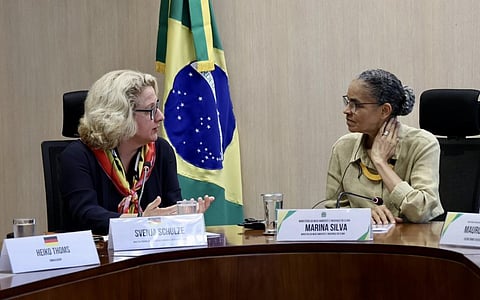Germany commits over $200 million for shattered Brazilian Amazon; but is it enough?
Svenja Schulze, Germany’s economic cooperation and development minister, announced January 30, 2023 that Brazilian environmental programmes would get 204 million euros ($222 million) from the German government.
The Amazon Fund, the largest international cooperation project to protect the Amazon rainforest and funded primarily by Norway, will receive $38 million of this amount, she told reporters in Brasilia.
The Amazon Fund was established as a Reducing emissions from deforestation and forest degradation (REDD+) method to collect donations for non-reimbursable investments in campaigns to stop and monitor deforestation.
The former far-right president of Brazil, Jair Bolsonaro, dispersed the Steering Committee that selects which sustainable projects are to be funded. He did this as he considered the Amazon to be an internal matter of Brazil. He even stopped government spending on the staff for environmental enforcement. Consequently, Germany and Norway responded by freezing their contributions.
The Amazon, the world’s largest rainforest, is twice the size of India. It shields and saves the planet from climate change as its trees absorb a substantial amount of carbon dioxide.
Roughly two-thirds of the Amazon rainforest is located in Brazil. Additionally, it contains 20 per cent of the world’s freshwater and is the most biodiverse forest on the planet.
Deforestation in the Brazillian Amazon hit a 15-year high as Bolsonaro overturned environmental protection laws in favour of agribusiness expansion. Satellite images show that between January and June 2022, 1,500 square miles of forest were destroyed.
“We already see the consequences of deforestation. There is more drought, shorter rainy seasons, an increase in fires, an increase in temperature,” said Mariana Napolitano, science manager at non-profit WWF-Brazil.
Additionally, Germany promised to provide $34 million to Amazon states to safeguard and maintain the rainforest and $87 million in low-interest loans to farmers to assist them in restoring deteriorated areas.
Schulze, outlining the opportunity to work in cooperation with the newly elected government towards climate mitigation, said:
With the new government and the team of President Luiz Inácio Lula da Silva and (environment) minister Marina Silva, we have a great chance to protect the forest and to offer a new perspective to the people who live there.
“Despite all the difficulties, the increase in deforestation, the land grabbing, the fires, the dire state of the indigenous populations, we see this as an opportunity to reverse this whole situation,” Silva said during the press conference.
President Luiz Inácio Lula da Silva, who took office in January, pledged to end deforestation through 2030. His four-year term ends in December 2026.
In his inaugural address, Lula said, “Our goal is to achieve zero deforestation in the Amazon and zero greenhouse gas emissions in the electricity matrix, in addition to encouraging the revitalisation of degraded pastures.” He insisted that Brazil need not require deforestation to maintain and expand its strategic agricultural frontier.
Lula has promised to support the Amazon’s indigenous people and environment. He reinstated changes including ending a Bolsonaro action that permitted mining in indigenous and protected areas and creating an indigenous peoples’ ministry.
For the appropriate utilisation of the funds that come for the protection of Amazon, the government has to strengthen the environmental protection laws that were weakened. It should ascertain that the funds flow towards the benefit and betterment of native people categorically.
The flow of capital alone won’t combat the issue of deforestation until its amalgamation with government policies and laws regarding the handling of Amazon is introduced.


